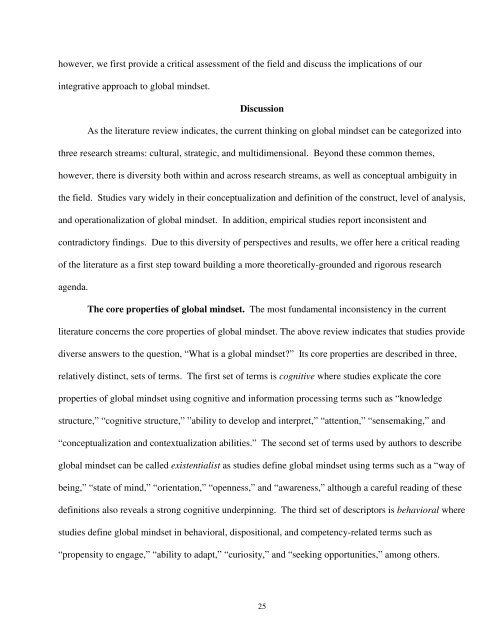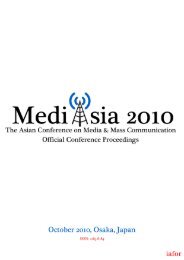What We Talk About When We Talk About “Global Mindset”
What We Talk About When We Talk About “Global Mindset”
What We Talk About When We Talk About “Global Mindset”
You also want an ePaper? Increase the reach of your titles
YUMPU automatically turns print PDFs into web optimized ePapers that Google loves.
however, we first provide a critical assessment of the field and discuss the implications of our<br />
integrative approach to global mindset.<br />
Discussion<br />
As the literature review indicates, the current thinking on global mindset can be categorized into<br />
three research streams: cultural, strategic, and multidimensional. Beyond these common themes,<br />
however, there is diversity both within and across research streams, as well as conceptual ambiguity in<br />
the field. Studies vary widely in their conceptualization and definition of the construct, level of analysis,<br />
and operationalization of global mindset. In addition, empirical studies report inconsistent and<br />
contradictory findings. Due to this diversity of perspectives and results, we offer here a critical reading<br />
of the literature as a first step toward building a more theoretically-grounded and rigorous research<br />
agenda.<br />
The core properties of global mindset. The most fundamental inconsistency in the current<br />
literature concerns the core properties of global mindset. The above review indicates that studies provide<br />
diverse answers to the question, “<strong>What</strong> is a global mindset?” Its core properties are described in three,<br />
relatively distinct, sets of terms. The first set of terms is cognitive where studies explicate the core<br />
properties of global mindset using cognitive and information processing terms such as “knowledge<br />
structure,” “cognitive structure,” ”ability to develop and interpret,” “attention,” “sensemaking,” and<br />
“conceptualization and contextualization abilities.” The second set of terms used by authors to describe<br />
global mindset can be called existentialist as studies define global mindset using terms such as a “way of<br />
being,” “state of mind,” “orientation,” “openness,” and “awareness,” although a careful reading of these<br />
definitions also reveals a strong cognitive underpinning. The third set of descriptors is behavioral where<br />
studies define global mindset in behavioral, dispositional, and competency-related terms such as<br />
“propensity to engage,” “ability to adapt,” “curiosity,” and “seeking opportunities,” among others.<br />
25









